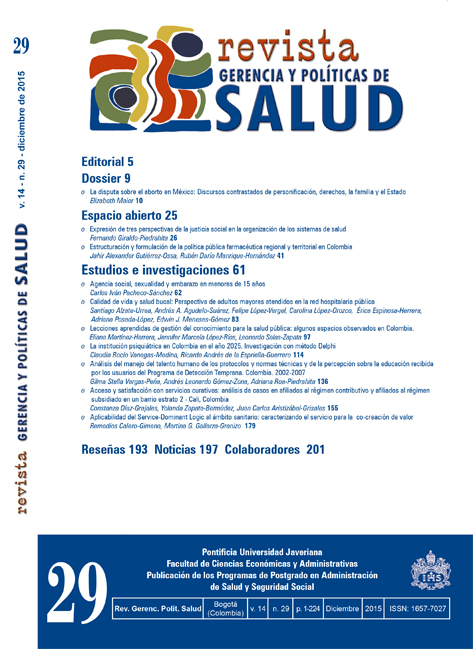Abstract
Teenage pregnancy has a high socioeconomic impact. The objective of this research was to
interpret the meanings of sexuality and pregnancy of girls under 15. An interpretive qualitative
study from the phenomenological approach of Alfred Schütz over common sense was carried out. 18 life stories were written with girls under 15 years who had pregnancy experiences in the cities of Bogota, Cali, Cartagena and Medellin. The meanings of menarche, the sexual onset, marriage, contraceptive use and delivery care are influenced by the social and institutional moral agency. The moral enterprise circulates through the spaces of socialization of teenagers: mothers, fathers, homes, institutions and professionals in the health and education sector which classify according to their common sense what is right or “normal” for teenage girls
Copyright notice
The Journal Management and Health Policies is registered under the Creative Commons Recognition 4.0 International license. Therefore, this work can be reproduced, distributed and publicly communicated in digital format, provided that the name of the authors and the Pontificia Universidad Javeriana are recognized. It is allowed to quote, adapt, transform, autoarchive, republish and create from the material, for any purpose (including commercial), provided that authorship is properly acknowledged, a link to the original work is provided and if changes have been mad. The Pontificia Universidad Javeriana does not retain the rights over published works and the contents are the exclusive responsibility of the authors, who preserve their moral, intellectual, privacy and publicity rights.
The endorsement of the intervention of the work (revision, style correction, translation, layout) and its subsequent disclosure is granted through a license to use and not through a transfer of rights, which means that the journal and the Pontificia Universidad Javeriana disclaims any liability that may arise from ethical misconduct on the part of the authors. As a result of the protection provided by the license for use, the journal is not obliged to publish retractions or modify the information already published, unless the erratum arises from the process of editorial management. The publication of contents in this magazine does not represent royalties for taxpayers.


